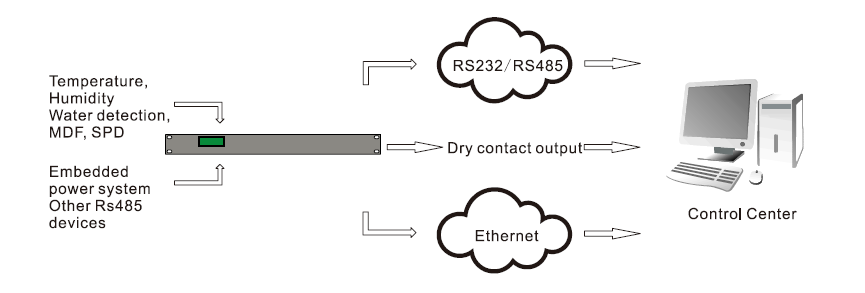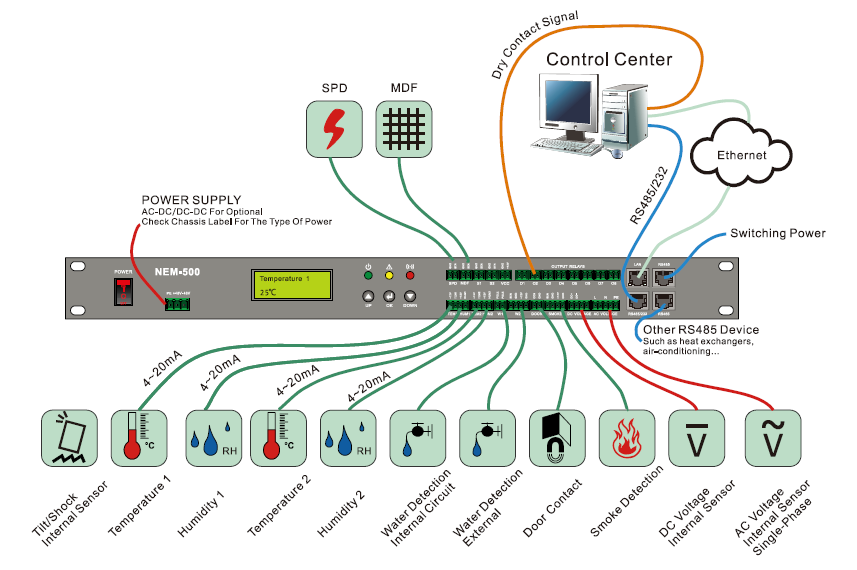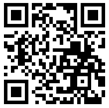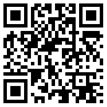For indoor & outdoor telecom network solution projects

1.Overview
This is a small high-reliability environment monitoring unit developed to provide environment/device control
and remote monitoring for communications base stations, integrated equipment rooms, and out-door cabinets.
The monitoring unit monitors important environmental factors such as temperature, humidity, smog, water penetration,
access control, vibration/leaning, main distribution frame (MDF), and surge protection device (SPD). When any value
collected by a sensor exceeds the preset threshold, an alarm is sent through the LCD, buzzer, or system log.
The monitoring unit also provides complete device detection functions, such as switch power status detection.
Through a preserved custom interface (optional), the unit can be connected to another sensor in main contact point
output type.
2.Features
W-TEL monitoring unit is designed for the outdoor cabinet application. It height is 1U-2U and suitable for standard 19-inch rack mounting. Front cabling, friendly installation, greatly facilitating testing, field commissioning and remote monitoring to all sensors for customers.
1>20-channel digital signal input with optoisolators can access the smoke alarm, door alarm, water immersion, SPD, MDF alarm, input AC failure, LLVD. The fire alarm has the reset function that prevents wrong alarming
2>4-channel temperature detection can sense temperatures of the main equipment cabin and battery cabin respectively
3>Humidity detection can be used to sense the humidity of the main equipment cabinet
4>Optional Chinese/English display module facilitates parameter checking and setting on site
5>Relay output can be used for controlling lamps, emergency fans and electronic locks
6>With operating indicator, alarm indicator, and buzzer
7>Card-reader interface supports mainstream card-readers to realize smart access control functions with the help of electronic locks
8>Setting the LED in the cabinet to on/off when opening/closing the door through the access control function
9>W-TEL monitor can be connected to the air conditioner, heat exchanger, power supply, and electric meter through the isolated RS232/RS485 port
10>The main equipment offers standard isolated RS232/RS485/RS422 communication interfaces for direct connection to wired or wireless MODEM, and supports Ethernet, optical fiber, E1 and other interfaces via optional conversion interfaces
11>It also offers 5V, 12V and 24V output with short-circuit protection for external sensors and electronic locks, so that you need no additional power supply
3.Product Appearance
Chassis dimensions (H x W x D) are 43.6 mm (1U) x 482.6 mm (19 inches) x 122 mm. Front cabling is adopted.
The following shows the front panel of the chassis:

Interface specifications
1) Power switch
It is used to power on/off the device.
2) Power interface
This device can be powered by AC or DC power supply.
AC voltage range: 85 VAC to 300 VAC;
DC voltage range: 20 VDC to 60 VDC
3) Liquid crystal display (LCD)
It displays sensor status data and parameter configuration pages.
4) Buttons
They are used together with the LCD for menu page up/down and parameter settings.
UP: — Go to the previous page up (when viewing), or increase the parameter value (when setting);
DOWN: — Go to the next page up (when viewing), or decrease the parameter value (when setting);
OK: — Confirm the selection of a menu option (when viewing), or of a parameter value (when setting).
5) LEDs
They show the operation and alarm status of the monitoring unit.
Power LED: — It indicates that the device is powered on and running;
Minor alarm: — It indicates a minor alarm;
Major alarm: — It indicates a major alarm.
6) Sensor input interfaces
Four current-type analog input ports, with 12 VDC power ports connected to temperature, or temperature and
humidity combination sensors;
Eight switch (dry contact) input ports, three of which with 12 VDC power ports connected to access control,
smog detector, infrared detector, or SPD sensors;
7) Dry contact (relay) output interfaces
Eight ports are available to send alarm signals to the upper-level alarm center, or to control the device’s
startup/close-down.
You can customize alarm rules, and associate any alarm signal with a relay among O1 to O8.
Ports O1 to O4 output switch signals;
Ports O5 to O8 control large-current devices such as fans and heaters.
8) RS485/RS232/Ethernet interfaces
Four ports: A is an optional Ethernet port; B and C are fixed RS485 ports; D is an
RS485/RS232 multiplex port that can be set to work in either RS485 or RS232 mode.
Port A, D can be switch by the system automatically.
Ports A and D are used to connect the remote computer or alarm center device;
Ports B and C are used to connect other RS485-interface devices, such as the
switch power, air conditioners, heat exchangers, and temperature and humidity sensors. (Note: Transparent data
transmission and forwarding are supported. The complete monitoring functionality is to be developed based on
standard communications protocols.)





